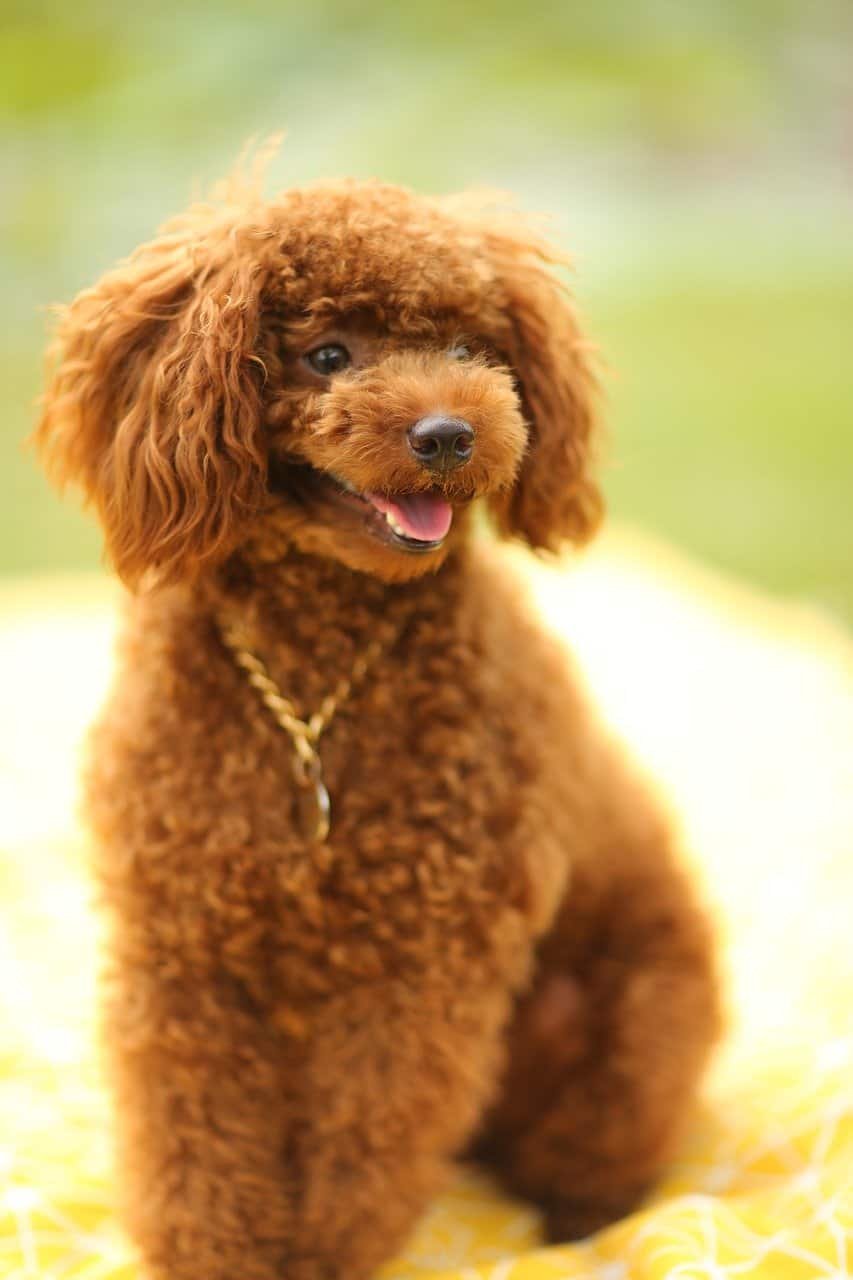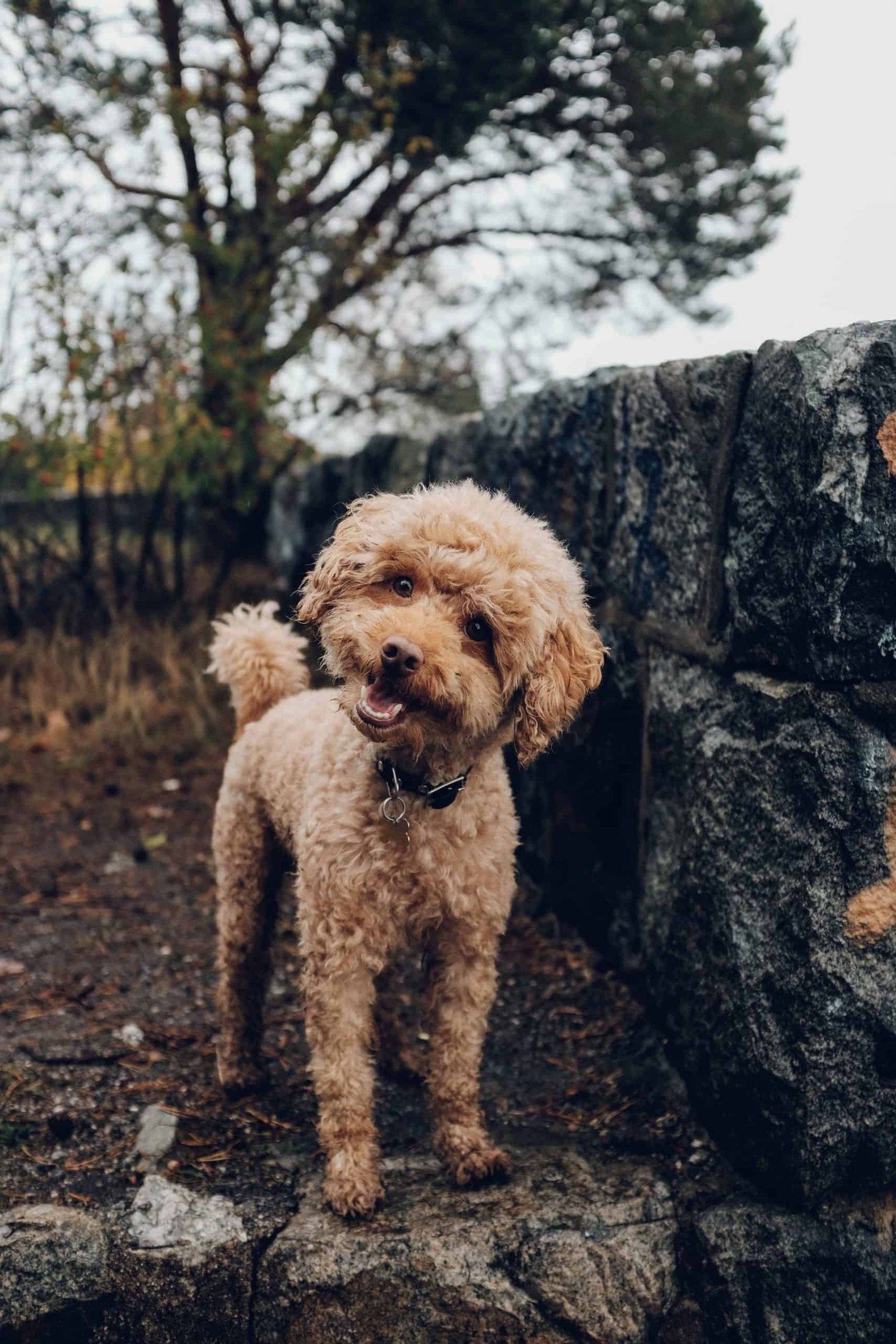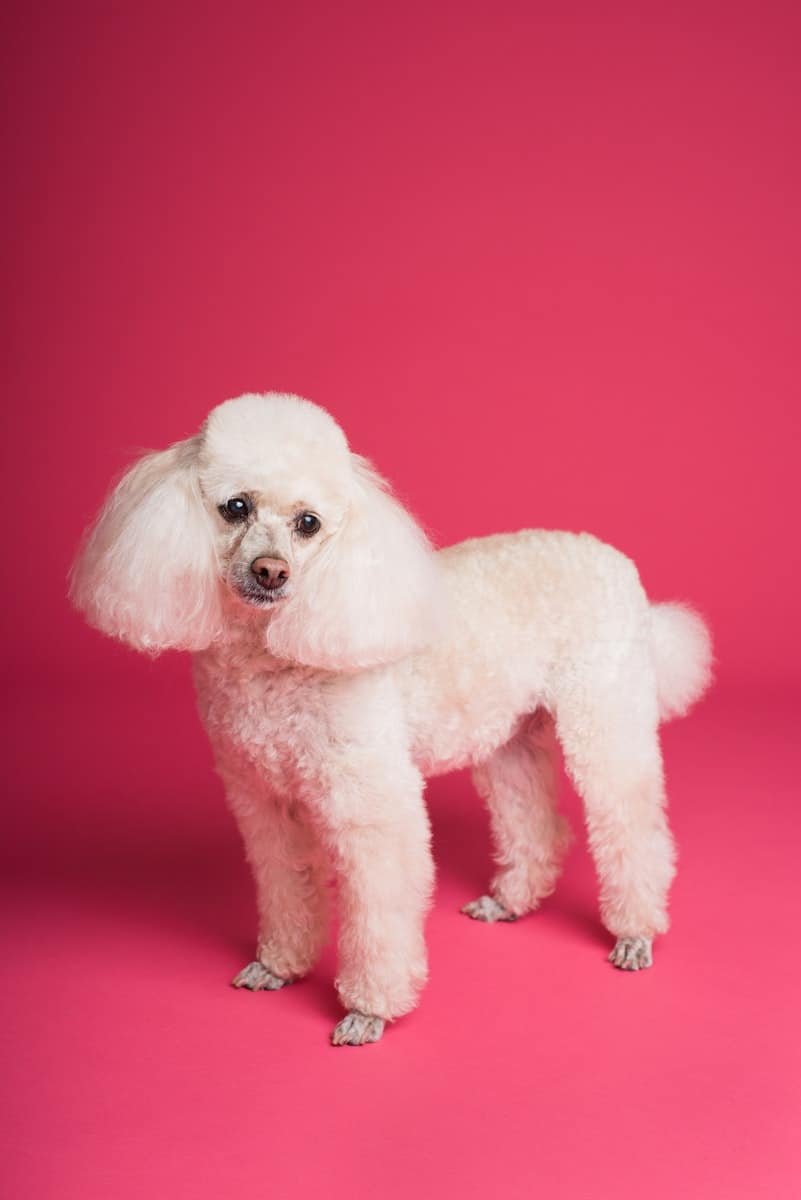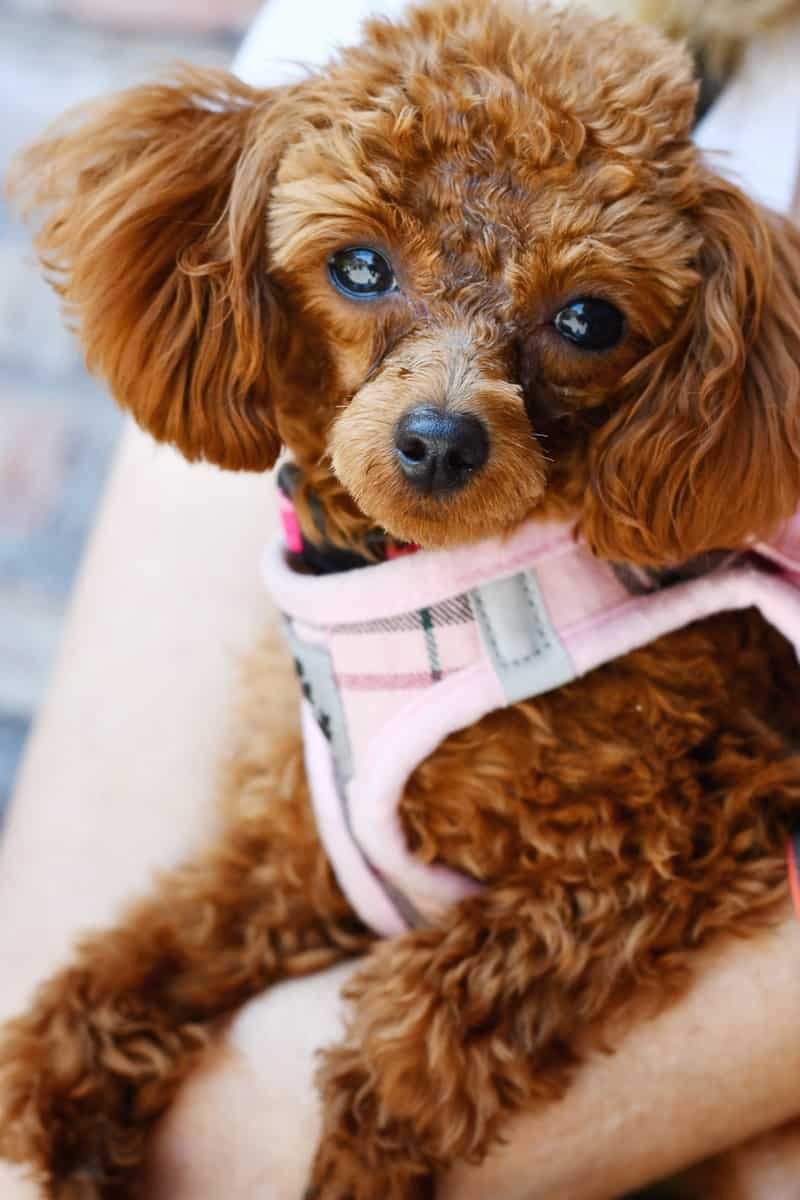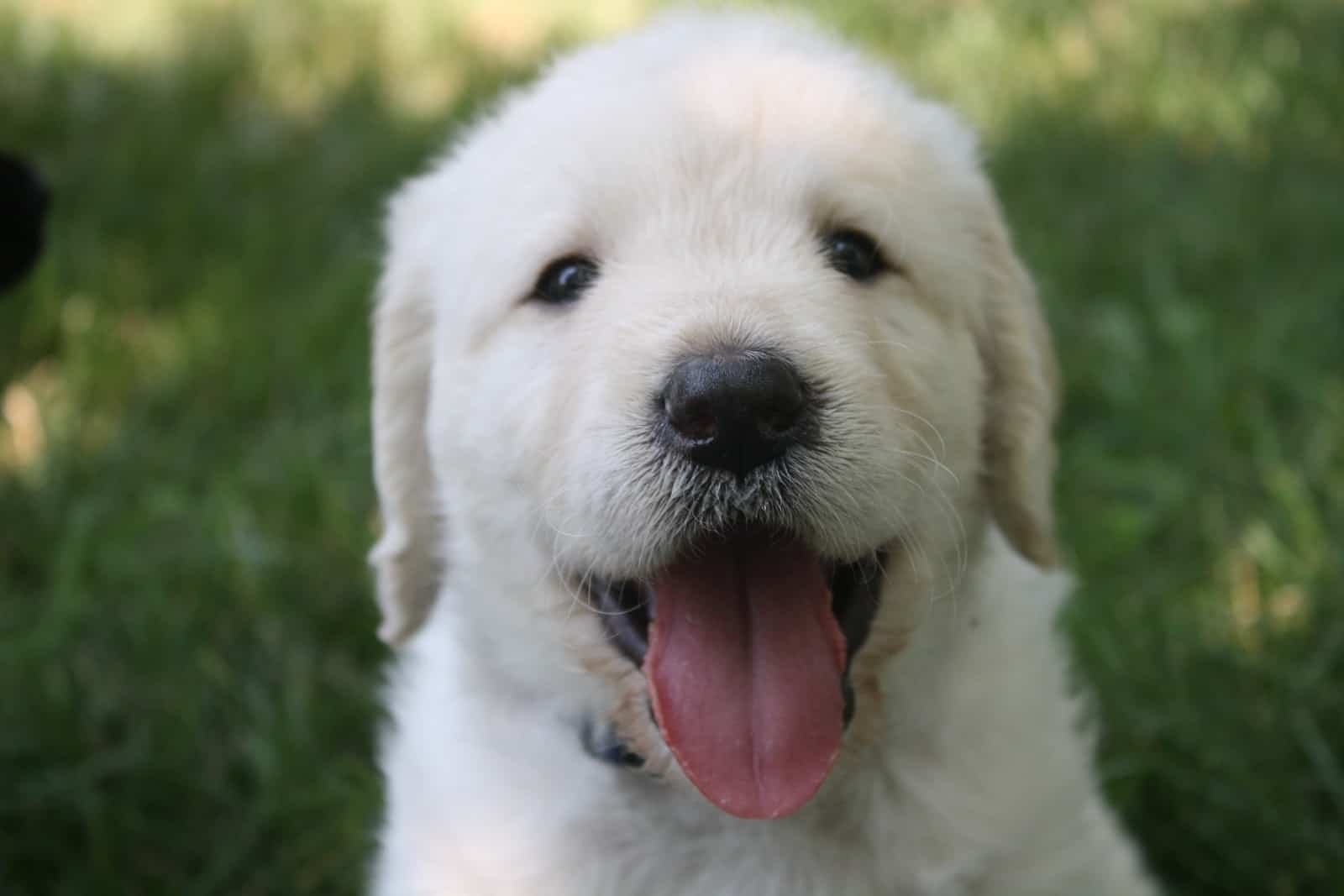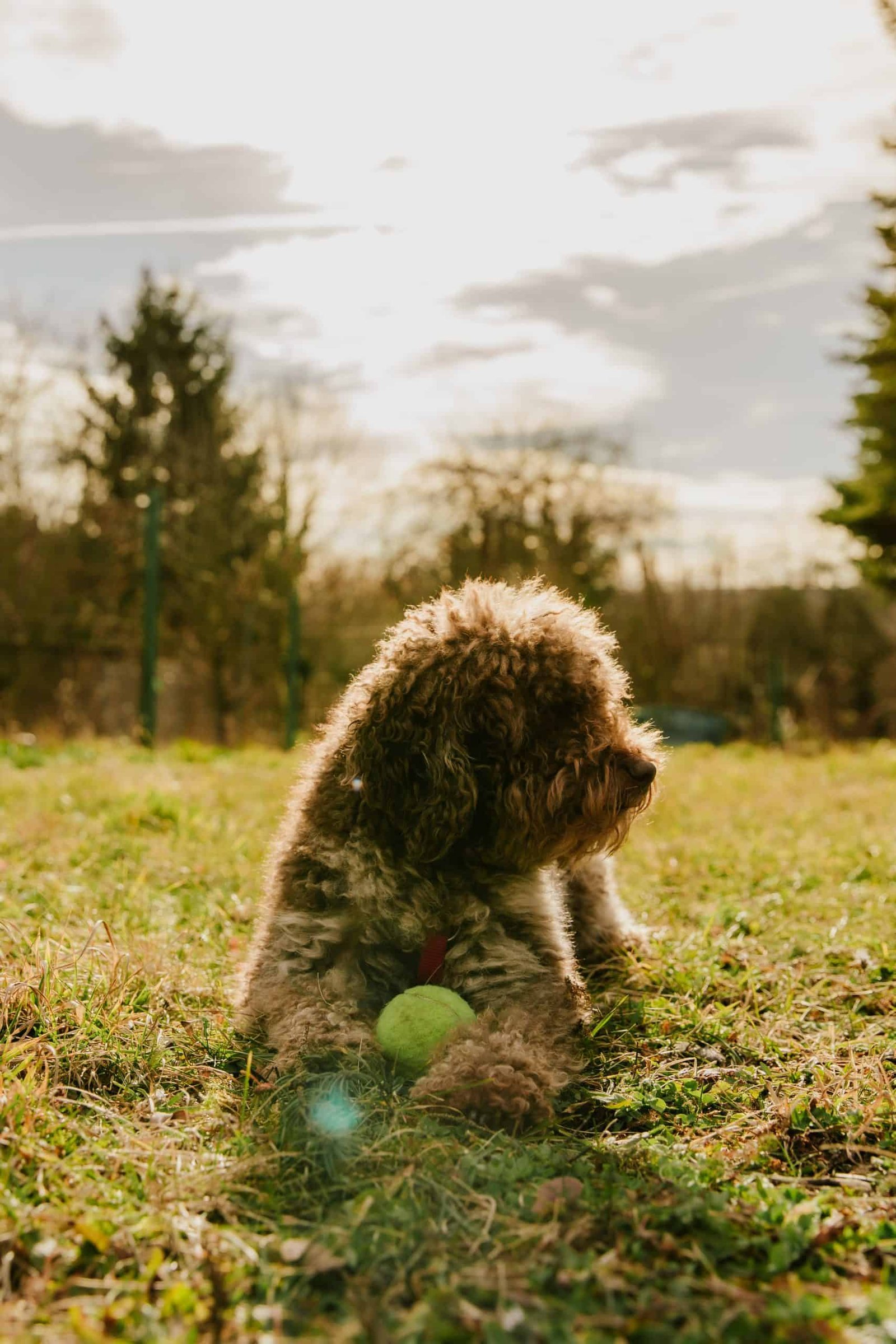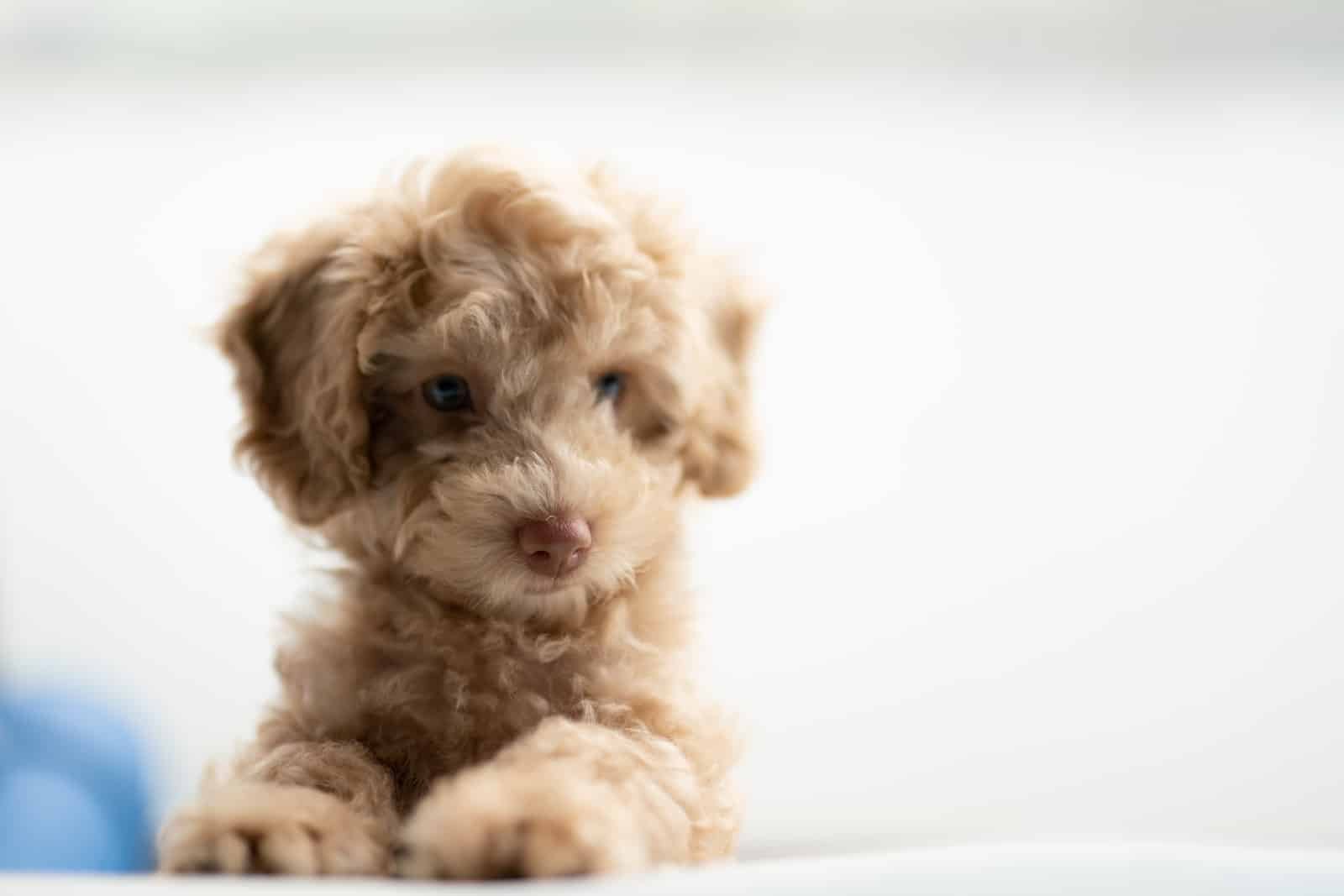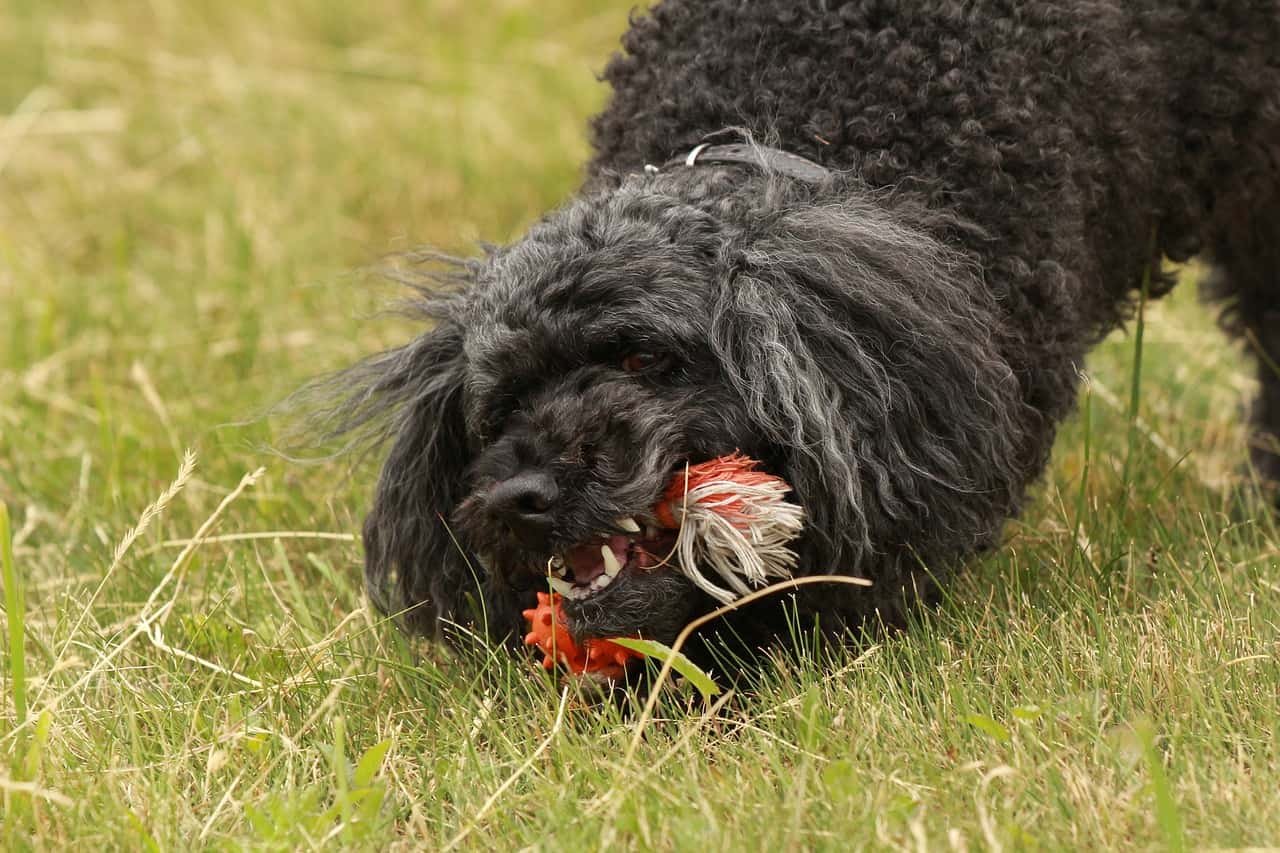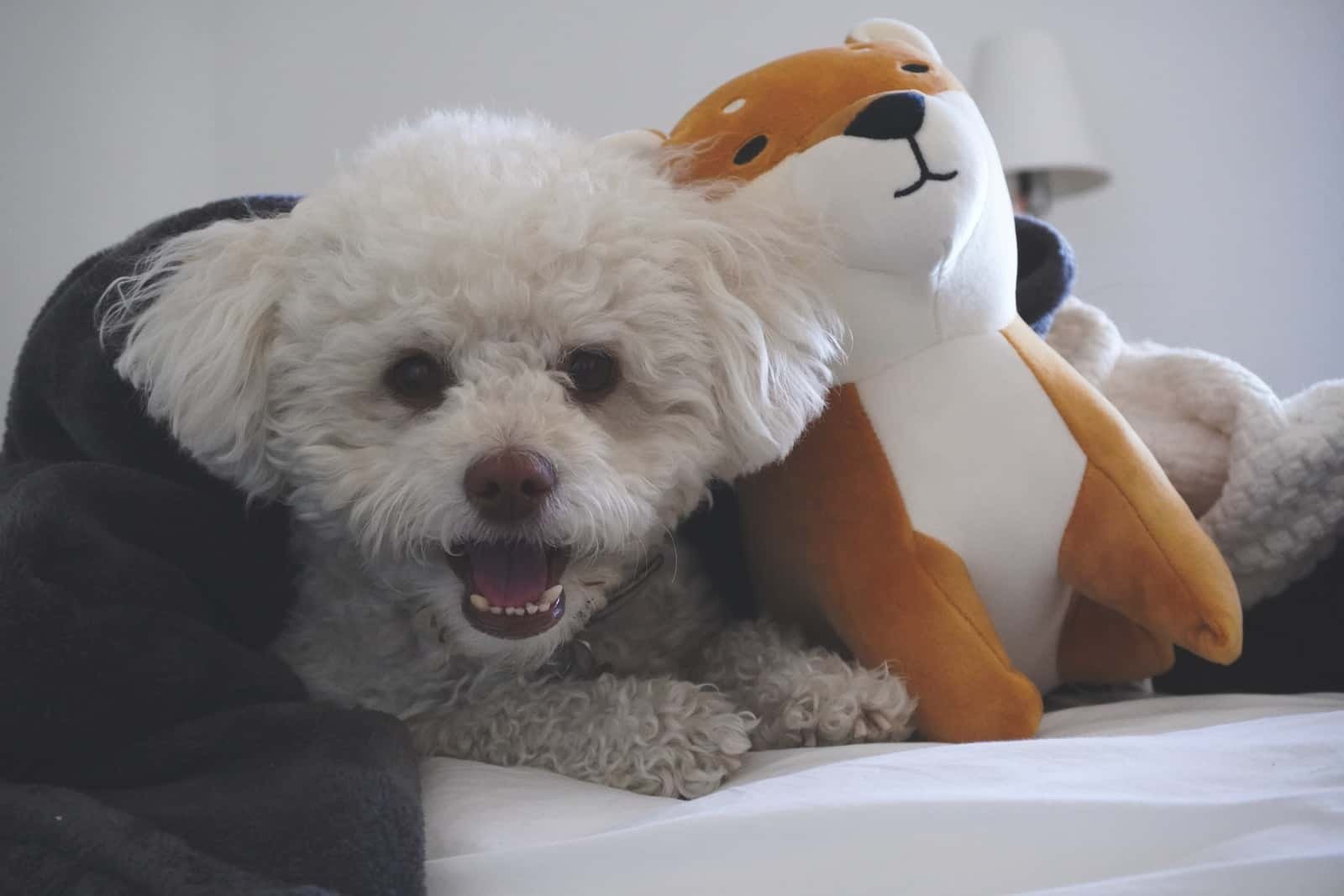
All About the Toy Poodle – A Tiny Pooch with a Big Personality!
Barely the size of a ruler, Toy Poodles are tiny.
But underneath their minuscule build, these curly cuties have so much to offer to their adoring fans. And no – they’re not doggy divas despite their high-maintenance looks.
Deep down, all that fluff is a spirited, classy athlete that’s actually pretty hardy. After all, they were merely bred-down from the robust standard Poodle breed.
Thus, Toy Poodles are pretty much like their larger counterparts, yet with small bodies. That, and a big personality that adds to their unique charms!
Lets get to know the smallest of the Poodle breed. Discover what makes them tick, their quirks, and how to care for this pocket-sized pooch.
Toy Poodle Origin and History
First things first – the Toy Poodle is not a breed.
Well, at least it’s not an AKC-recognized dog breed.
However, it is a bred-down version of the Standard variety. Poodle origins have been traced back to Germany, despite being mistaken as a French dog.
As discussed in our previous post (link to Standard Poodle post), Standard Poodles are prized duck hunters and waterfowl retrievers. These canines have been around since the 1800s and are reminiscent of the Barbet, a much larger French water dog trained for the same purpose.
Interestingly, some Bas-reliefs point out evidence of Poodles being around during Ancient times! These dogs served as family pets and hunting companions for humans due to their inherent intelligence.
What about Toy Poodles?
Poodles are bred for duck hunting, but their smaller cousins have a different purpose: For companionship.
Contrary to popular belief, Toy Poodles aren’t new kids on the block. In fact, evidence dates back to the 18th century.
These itty-bitty canines have delighted the aristocrats and nobilities in France, Germany, and many parts of Europe. Not too long after, the rest of the world caught on to their enigma. American icons including Elvis Presley, Marilyn Monroe, Walt Disney, and Elizabeth Taylor are just proud Poodle parents.
Today, people from all walks of life get to enjoy these little charmers!
Toy Poodle Physical Traits & Appearance
We’ve already established that the Toy Poodle is a size reduction of the standard varieties.
Miniature Poodles and Toy Poodles are two of the smaller breed size varieties. But what separates one from another?
Toy Poodles measure approximately 10 inches at the shoulders. On the other hand, Miniature Poodles (link to the soon-to-be-written miniature poodle article) are a smidge taller than the Toy variety at 15 inches.
These tiny canines tip the scale at around 4 to 6 pounds. This is why they’re portable and compact pups that you can easily fit in your purse… Or pocket!
Now, let’s talk about the build and unique features.
These tiniest of Poodles have a well-proportioned, squarely-built body. The muscles are smooth, and they have straight and long muzzles.
Their eyes are oval-shaped and dark, which are often nearly concealed by their thick coats.
Speaking of coats…
A To Poodle comes in different coat colors. The official AKC-recognized Poodle Breeds coat colors include blue, cream, apricot, grey, brown, black, red, silver beige, silver, and white.
As if that list is not enough, there’s also a whopping 18 acceptable dual-tone coat color combinations!
No matter what the color, their coats always come in tight curls. In fact, their coat tends to cord as dreadlocks when left ungroomed for a long while.
This is why Poodle owners need to be on top of their dog grooming duties. And it is also one of the major reasons why these canines are high maintenance.
The only saving grace for that reputation is they’re shedding-free. Unlike other densely-coated pups, these tiny Poodles do not shed.
Instead, all that hair just keeps growing throughout their lifetime.
To keep things under control, you need to trim their coat every 6 to 8 weeks. Daily brushing is another grooming must-do. This helps to keep the tangles, matting, dirt, and debris at bay.
But for more practical Poodle owners, they prefer to cut their Poodle’s coat nice and short, with or without their trademark pom-poms. This pet clip spares them from having to deal with the monthly trimming.
Temperament and Behavior Concerns
One thing to note about the Toy Poodle: They can be fussy fellows.
These tiny canines are highly protective of their favorite human and maybe a bit on the yappy side toward strangers. Hence, early training is a must to raise these minuscule Poodles well.
Fortunately, the Toy Poodle shares the same smarts as the standard varieties. This Poodle breed standard makes them relatively easy to train.
Combined with their strong desire to please their owners, rein them in should not take long. As a result, you can have a mild-tempered, loving pet.
Being that they are bred as companion dogs, Toy Poodles thrive on your attention and presence. They don’t take separation from their owners too well.
When kept alone for long periods, these breeds can become anxious, stressed, and uneasy. Destructive behaviors in these lonesome poodles are not unheard of.
So, if you have a 9 to 5 job, you need to factor in pet-sitting costs before bringing home a Toy Poodle. Otherwise, you are putting your pet’s well-being in jeopardy.
Now, let’s talk about the good parts…
If you suffer from allergies, Poodles may be a suitable pet for you.
Despite their thick coats, these canines are actually hypoallergenic. They do not shed like other densely-coated dogs. This holds true for both the curly coat and corded coat Toys.
This spares you from having to clean up after these pups all the time.
Additionally, these small Poodles are not your sissy couch potatoes. In fact, they are agile athletes that are always up for fun and games.
These brainy creatures excel in agility competitions, retrieving, and obedience training. You can easily tag them along on your outdoor adventures.
Got some tricks you want your puppy to master? These miniatures have a high trainability factor as they are one of the most intelligent breeds there are.
Need a hiking buddy? These tiny but hardy fellows fit the bill.
These miniatures have the makings of a great watchdog. They possess extreme intelligence and protective instincts.
Poodles will not hesitate to bark sharply at a stranger.
Early training and socialization are essential to developing desirable traits and personalities in these dogs. This will help curb their aggression while teaching them to accept other pets in the house.
So we’ve talked about the good. Now, let’s touch on the uglies.
These miniatures are dogs of habit and routine. They prefer to have the same routines or patterns each day. Otherwise, they get flustered when their days have a change of pace and rhythm.
Moreover, Toy Poodles are hypersensitive creatures. Sudden and startling loud noises stress them out. They can snap nervously at the slightest sound.
Got some high-energy kids in the house? This breed is not made for rough-housing. The last thing they want is to be in the midst of a boisterous crowd.
Noise, rough handling, and conflict are major sources of stress for these tiny canines. All they want is harmony in their surroundings.
Generally, they do better in families with older children.
So, if you want a light and agile dog, this is one of the most popular breeds for you. These pups can live happily in an apartment with a small yard.
These breeds are moderately easy to housebreak and train. And as a bonus, they are relatively non-shedding, which is a great match for allergy sufferers.
On the flip side, they are emotionally sensitive to the chaos, which causes them to bark too often and become high-strung.
Their pleasant personality is the outcome of a favorable environment and plenty of training.
Poodle Training Tips
Historically, Standard Poodles are noted for their trainability and intelligence.
Although these Toy varieties don’t share the working roots of their ancestors, they are nonetheless just as brainy.
You can channel these smarts to shape your beloved pet into the well-behaved pooch you want it to become through constant training.
We also recommend providing ample exercise to your canine.
These dogs require plenty of physical activities. Mentally and physically stimulating games are a way to a Poodle’s heart. An hour of exercise and playtime each day should suffice.
Lastly, be sure to socialize your pooch early. Plenty of socialization helps them to become more at ease with their surroundings.
Poodle puppies can benefit from a fun introduction to your household members. Allow them to get used to everyone in the house, especially children. As a result, they will become the sweet, beloved family pet you desire to have.
Genetic Diseases and Health Care Tips
According to a survey by the United Kennel Club in the UK, Poodles have 14 years.
Just like every canine, however, miniatures are predisposed to health problems.
One of these genetic diseases is cataracts. About 10 percent of this small Poodle variety suffers from this eye condition.
Progressive Retinal Atrophy is another vision concern with these canines. This degenerative disease causes the retina to lose its function. Over time, it leads to blindness.
Fortunately, DNA tests are conducted by a veterinarian specializing in ophthalmology to determine if your pet is likely to develop this disease. You can also have your puppy screened for cataracts to prevent it from worsening.
Another health concern among Toy Poodles is Patella Luxation.
This causes the knee cap to slip out of position. When left untreated, it can result in lameness. Luxating patellas are an issue with many small dogs. Some cases occur from birth, while others are acquired during adulthood.
Breeders should provide certificates demonstrating that the Poodle puppies are free from this knee joint problem.
Lastly, all Poodle sizes are at risk of thyroid problems. Common symptoms of this health condition include weight gain, lethargy, hair loss, and skin infections.
Thus, you need to ask your breeder if any puppies in their family tree have this condition.
Are Toy Poodles Good Family Pets?
These miniature dogs are excellent pets for most people.
By nature, these small dogs have a pleasant demeanor. When trained correctly, they can be polite and loving to their favorite humans.
If you can provide a loving home for this placid-natured canine, then you are a good fit for it.
They are intelligent breeds that thrive on peace and harmony in the house. Furthermore, they require attention from their owner.
Ample exercise and playtime are key to a happy and content Poodle. Playing fetch, romp around the yard, and some mentally challenging toys can keep them in good shape.
Usually, these dogs are healthy. Although they are not immune from genetic ailments, they are not prone to severe health issues. This is why owning a Poodle it is a good idea to consider..
But there is one caveat – they require proper handling.
These dogs have delicate bodies. Knowing this, you should not leave your toddler alone with a Toy Poodle unsupervised. Rough games can easily injure this small creature.
Bottom Line
Smart, agile, and affectionate, Toy Poodles are one of the most popular choices for pets.
They are healthy creatures and possess a high trainability quality, making them suitable for first-time and experienced dog owners.
These dogs can do well with all family members – as well as other four-legged creatures in the home.
But do take note that there is no such thing as a perfect pet. Although these miniatures have dozens of amazing traits, there are some concerns to consider.
They require constant attention, proper training, and daily exercise. When given all of these conditions, you can expect your pet to blossom and become the amazing furry friend you deserve to have!

